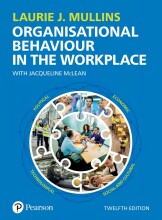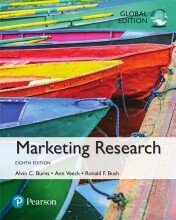Summary: Mullins: Ob In The Workplace_12 | 9781292245508 | Laurie J Mullins
- This + 400k other summaries
- A unique study and practice tool
- Never study anything twice again
- Get the grades you hope for
- 100% sure, 100% understanding
Read the summary and the most important questions on Mullins: OB in the Workplace_12 | 9781292245508 | Laurie J. Mullins
-
0 Your study of organisational behaviour
-
0.2 What is organisational behaviour (OB)?
This is a preview. There are 1 more flashcards available for chapter 0.2
Show more cards here -
What is organisational behaviour?
The study and understanding of individual and group behaviour and patterns of structure and management in order to help improve organisational performance and effectiveness -
0.11 Making yourself more employable
This is a preview. There are 10 more flashcards available for chapter 0.11
Show more cards here -
What are the 3 factor of motivation
Direction
initiation
persistente -
what is Job performance and the 3 elements that equate with job performance?
Job performance tells how well you do the job
3 elements
Effort ( how much effort does someone puts in the job )
ability ( is the person capable of doing the job )
external factors( these also have an effect on job performance) -
What is Maslow Hierachy
The Maslow theory indicates that people get motivated once their basic needs is sasitfied they want to go to a higher level of needs ( this is a more demanding one ). -
How to apply the Maslow theory on the workplace
First you need to know that eachindividual the needs of a persondiffers from each other. Second is you need to know your teammembers better. You need to know their private life. Cause notal needs can befully met only at work. some rewards satified more than one need. -
What is the Mcclelland theory
This theory refers that everyone has 3 needs - the achievement - power and affiliation. Every person has these three components however, one of those 3 stand out the most. Thus, applying this theory the manager needs to each of his team member and need to know which of the 3 variables are prominent. -
Which elements are important to develop passion for work?
1. Autonomy
2. Growth
3. Connection with colleagues and leaders
4. Meaning full job
5.fairness
6. Regonicition
7.collabration -
Give examples for extrinsic rewards
- People wil join the organization
- they stay with the organization
- perfom better
- People wil join the organization
-
give examples for Internisc rewards
- Regonicion
- sense of accomplishment
- chance to learn a new skill
- feeling responsibility
- Regonicion
-
Explain the three variables of expectancy theory
Expectancy - the employee expect that with the effort he puts in a reward will come out
instrumentally - the manager does not keep its promise about the rewards.
valence - is the value of the reward. So the attractiveness of a reward.
- Higher grades + faster learning
- Never study anything twice
- 100% sure, 100% understanding
































